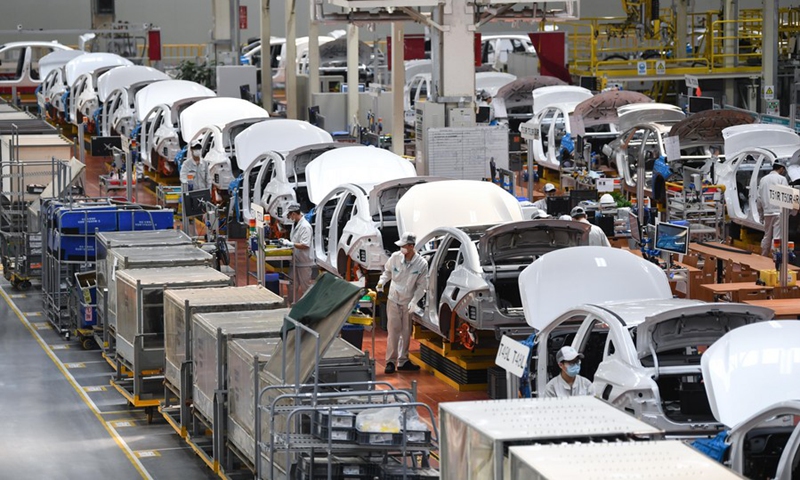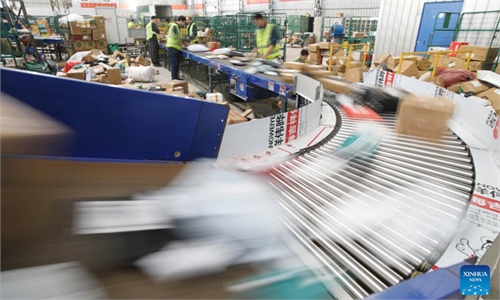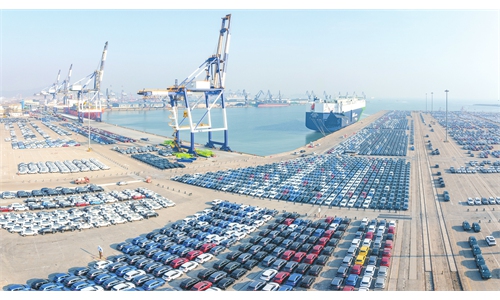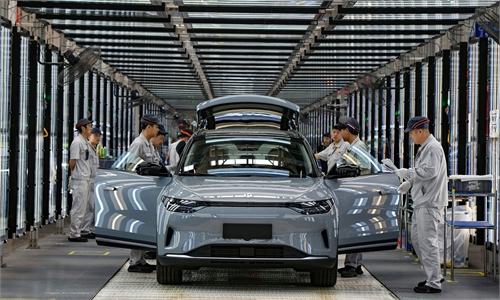
This photo taken on Feb 24, 2023 shows the assembly line of GAC Aion, an NEV subsidiary of Guangzhou Automobile Group Co., Ltd. (GAC Group), in Guangzhou, south China's Guangdong Province. Photo: Xinhua
Chinese carmakers released their sales results for 2024 on Wednesday, with multiple companies posting robust new energy vehicle (NEV) sales growth of over 50 percent year-on-year, becoming an important force in driving NEV development globally amid the green shift.
Chery Holding Group Co said on Wednesday that it sold a record 2.6 million cars in 2024, bringing the group's annual revenue to 480 billion yuan ($65.75 billion) for the first time. Last year, the group sold 583,569 NEVs, soaring 232.7 percent year-on-year, the company said in a statement on its WeChat account.
Chongqing Changan Automobile Co said on the same day that the company sold 2.68 million cars in 2024, setting a new high in seven years. The company's sales of NEVs exceeded 730,000 units last year, which marks an increase of over 50 percent year-on-year.
Additionally, Zeekr said that it delivered 222,000 cars in 2024, a year-on-year increase of 87 percent.
"The country's large-scale trade-in program to support car spending as well as the rapid development of the NEV industry directly contribute to domestic carmakers' better-than-expected NEV sales growth last year," Cui Dongshu, secretary general of the China Passenger Car Association, told the Global Times on Wednesday.
In a milestone for China, the world's biggest auto market, the retail penetration rate of NEVs in China exceeded 50 percent for the first time in July, reaching 51.1 percent. By November, the country's annual NEV output surpassed 10 million for the first time, making China the first country globally to achieve this feat.
Along with the advancements in research and development of NEVs in recent years, Chinese automakers launch more new models, further deepening the progress of China's transition to NEVs.
For the full year of 2024, NEV sales are expected to reach approximately 13 million units, pushing the country's total auto sales to around 31 million units, Chen Shihua, a deputy secretary-general of the China Association of Automobile Manufacturers, told the Global Times on Wednesday.
"Looking ahead, the growth of NEVs in China continues to show strong momentum in 2025, and is expected to post relatively fast growth," Chen said, noting that Chinese automakers, especially NEV manufacturers, will encounter growth opportunities in multiple aspects.
The Central Economic Work Conference held in December pointed out that the country will increase the issuance of ultra-long special treasury bonds and continue to support projects for implementing major national strategies and building security capacity in key areas, as well as the implementation of large-scale equipment upgrades and consumer goods trade-in programs in 2025.
Consistent policy support will continue to drive car consumption in 2025, with the automobile market expected to maintain stable growth, Cui said.
Globally, EVs are expected to account for about 45 percent of car sales in 2030 and 55 percent in 2035, according to an article on the International Energy Agency website in December.
The article stated that a crucial factor in the growth pace across markets will be the affordability of EVs, citing China as an example where affordable models are driving mass adoption.
Changan Automobile's Deepal recently announced that it aims to sell half a million cars globally in 2025, of which a total of 100,000 units will be sold out overseas, covering 81 countries, the Securities Times reported.
Meanwhile, Zeekr said that it will challenge the sales goal of 320,000 in 2025.
NEV technological innovations create new growth potential for the industry, and automobile manufacturers should prioritize technological innovation, and drive industrial progress through technological advancements, Chen said.
To promote high-quality development of the NEV industry, it is important for companies from various countries to strengthen communications and cooperation, Bai Ming, a research fellow at the Chinese Academy of International Trade and Economic Cooperation, told the Global Times on Wednesday.
China has always maintained an open and cooperative attitude, promoting closer industrial cooperation between domestic and foreign automotive companies and sharing the opportunities for development in the NEV industry, Bai said.



